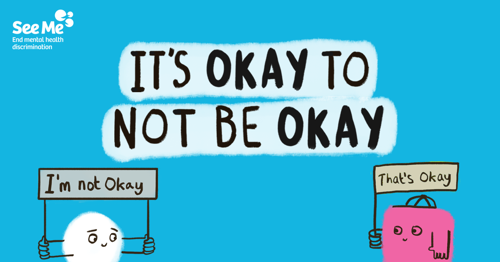Up to 6000 Pupils in Schools Across the Borders to Benefit from Mental Health Stigma Training
Posted by See Me, 25 June 2018
Schools across the Borders have joined up with a leading mental health programme to tackle stigma and improve mental health for young people.

In a first for Scotland, all secondary schools in one council area have joined together to work with See Me, the national programme to end mental health stigma, through a join initiative of Borders Council and NHS Borders.
Around 80 staff, and nearly 1000 pupils are being trained in in Scottish Mental Health First Aid, and See Me’s ‘What’s on your mind?’ pack.
The What’s On Your Mind pack is for young people and the adults in their lives, to help build confidence on discussing mental health, look at the impact of stigma and discrimination and how we can tackle it.
Teachers began their training in May, and See Me started working with pupils in June. Once training is complete the staff and pupils will be able to take the pack back to teach in their schools, potentially reaching over 6000 pupils in the Borders.
Getting young people to talk about mental health is a key focus for See Me. A previous study from See Me found that of 885 young people aged 15-25, found that only 37% said they would tell someone if they were finding it difficult to cope with their mental health, compared to 78% who would tell someone if they were physically ill.
Ninian Grant, an S6 pupil at Earlston High School, who is one of the pupils to be trained, said:
“I don’t think it’s easy for young people to talk about mental health, but hopefully with this training it will become easier and easier to talk, because it reduces the stigma and helps people understand better what is going on."
“We cover anxiety, depression, suicide, symptoms of a panic attack and how to help someone. It’s been very informative and useful.”
See Me youth volunteer, Sally Nimmo, 24, is helping to train the pupils. She said:
“When I was in school we didn’t get anything on mental health, we didn’t know what mental health was. In PSE mental health was disregarded, so I think this is really important to give the kids space to talk about things which they have maybe never spoken about before.
“The more opportunity you give young people, the more comfortable they become in speaking about it."
I think getting young people to ask questions about suicide is really useful, because they probably will have never done that before, and it is a really useful skill to have.”
Councillor Carol Hamilton, Scottish Borders Council’s Executive Member for Children and Young People, added:
“In this, the Year of Young People, it feels particularly important that we do all we can to give our young people and the staff who work with them the tools, training and opportunities they need to develop emotional resilience and also to make sure they know what support is available and where they can turn to for help if life should become difficult.
“The See Me programme aims to do just that and I commend the commitment of the staff who have worked so hard to develop such a robust programme that will be of genuine benefit to pupils and professionals alike. It is encouraging to see the feedback from Ninian saying just how useful the training has been and I hope that all our S6 pupils make the most of this opportunity when it is offered to them.”
At a launch event for the work today (JUNE 25) Laura Sharpe, See Me’s education and young people manager, said:
“We want to see a culture shift in Scotland around mental health. This needs to start in schools so children and young people are having open conversations on this from an early age."
“Too many young people feel they can’t speak about how they are feeling, often because they worry about being judged or dismissed.
“To help young people recover from mental health conditions they need to be able to speak about it, to get care and support quickly. It only takes one adult to make a difference to a young person’s life, we all have the power to listen and help someone to get the support they need.
“So we are delighted that schools across the Borders want to help equip adults and young people to have these important conversations on mental health and tackle the stigma which still exists.”
